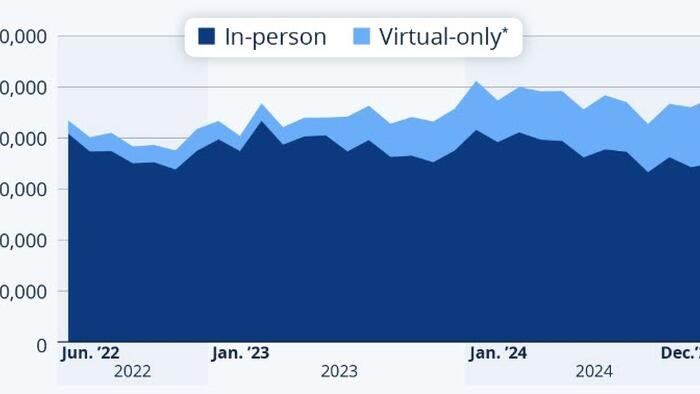NGO Society of Family Planning reports that the number of virtual-only abortion appointments has increased in the United States since the overturning of Roe v. Wade by the Supreme Court three years ago, leading to a rise in overall U.S. abortion numbers.
Statista’s Katharina Buchholz notes that experts believe the rise in virtual-only appointments has improved access to abortions for women in rural areas, regardless of the legal status of abortion in their state.
For decades, U.S. abortion numbers had been declining due to various factors, including restrictions imposed in the pre-internet era. However, abortion numbers began to increase before the overturning of Roe v. Wade, signaling a shift in trends.
Explore more infographics at Statista
Following the Supreme Court decision in June 2022, providers initially experienced a decrease in appointments, but the prevalence of virtual-only appointments using abortion pills via mail began to rise after states gained autonomy to enact their own abortion laws. By December 2024, the Society of Family Planning estimated nearly 26,000 such appointments, a significant increase from three years prior.
Virtual-only appointments are available in states where abortion is legal, and some are provided through shield laws in states where abortions are prohibited. These laws allow providers to offer services to patients from states with restrictive abortion laws. States like California, Colorado, Massachusetts, New York, and Washington have implemented shield laws.
Additionally, brick-and-mortar abortion providers have seen an increase in virtual appointments, although these numbers were previously combined with in-person appointments. While the exact number of virtual appointments by these providers is around 1,500 per month, they represent a smaller portion of virtual appointments overall.
Currently, 14 U.S. states have banned abortions, with states like Texas, Tennessee, and Indiana having the most stringent restrictions. Four states, including Florida and Georgia, limit abortions to early gestational ages. Strict bans in five states are currently facing legal challenges.
Loading recommendations…

